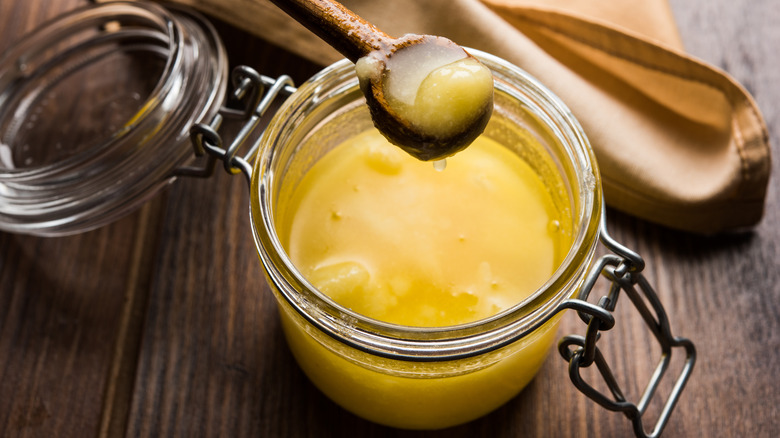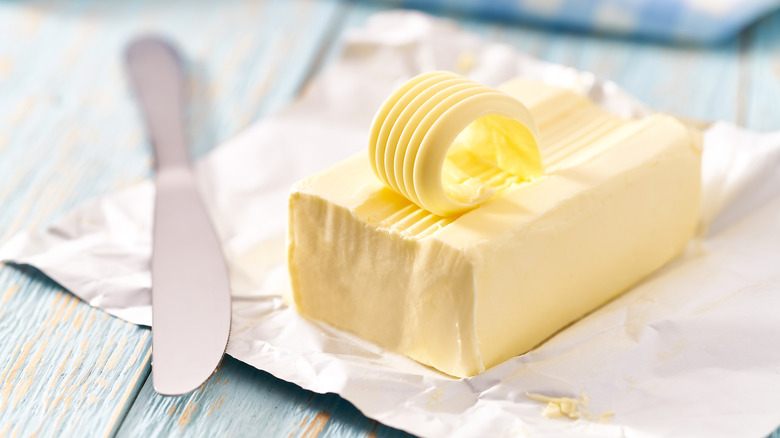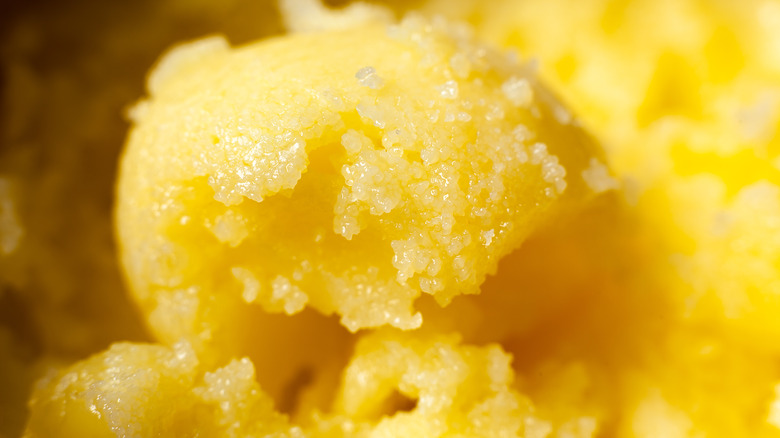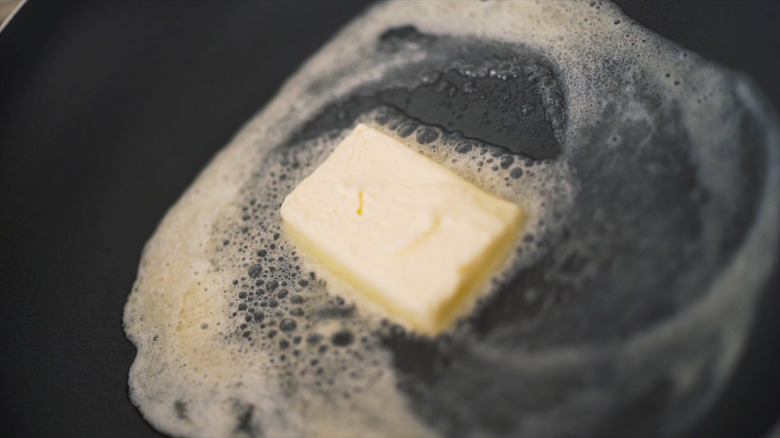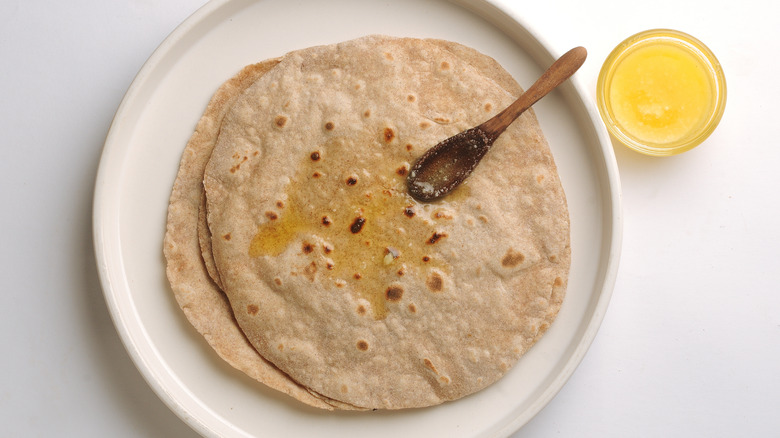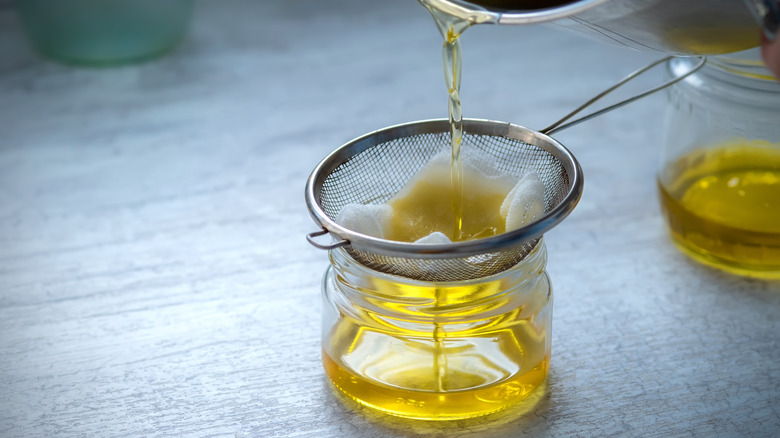Ghee Vs. Butter: Which Is Healthier?
Can you even fathom a world without butter? Whether you use it to cook or bake savory foods, desserts, and pastries, or reach for it when sautéing, grilling, or frying, butter makes everything better. So much so that butter is considered to be superior to olive oil, says HuffPost. After all, you wouldn't put olive oil on toast for breakfast now, would you? However, there is a type of clarified butter that is taking a lot of people's attention — it's called ghee — and there's good reason why you should know about it.
In general terms, butter is made by churning milk, usually cow's milk. Ghee, on the other hand, is a type of clarified butter that's produced by heating butter until the liquid separates and the milk caramelizes into solids, leaving behind only the oil. That oil is what is known as ghee, according to Healthline.
Another Healthline article says that ghee has been around for thousands of years and is a staple in Indian and Pakistani cooking. The website explains that ghee was originally created from butter by removing all its milk solids. This was done so that the butter wouldn't spoil in warm weather. (Since all the milk solids are removed, ghee does not require refrigeration.) In fact, it can be stored at room temperature for weeks, and it will turn solid in cold temperatures just like coconut oil.
Which is healthier: ghee or butter?
According to Healthline, one tablespoon of butter has approximately 102 calories whereas one tablespoon of ghee has approximately 120. Ghee also has a higher fat concentration than butter. Despite this, the site says that the difference between butter and ghee's nutritional profiles isn't significant. However, since ghee is made by removing milk solids, it does have some added benefits that butter does not.
For one, ghee is lactose-free, making it a great alternative to butter for people that are allergic, or have an intolerance, to dairy products. When heated, ghee also produces less acrylamide, a chemical compound that comes from heating up starchy foods that is known as a toxin and may be linked to cancer.
Bon Appétit suggests that ghee also has certain health benefits according to the Indian Ayurvedic medicinal tradition that has used it for centuries for its purported anti-inflammatory and beneficial digestive properties. The Ayurvedic system suggests that roasting spices in ghee will make them more flavorful and doing so will also activate the nutritional benefits within spices as well.
Do butter and ghee taste different?
You may notice a difference in taste between ghee and butter. Since the making of ghee removes all of the milk solids, it can create a wholly different taste and mouthfeel. The article notes that while butter has a soft, creamy, and rich texture with a hint of sweetness, ghee does not. On the flip side, ghee usually has a nuttier, slightly roasted flavor.
This is because of the process of making it that requires butter to be heated up until the milk solids separate and sink to the bottom of the pan, where they turn golden brown and start giving off a toasted aroma. It's a process similar to that of making brown matter or beurre noisette (via Masterclass).
However, Milkio notes that the taste of both butter and ghee largely depends on the brand purchased and is based on the quality of the milk that each brand uses in the making of their product.
Can you substitute ghee for butter?
According to Healthline, the only time you really want to substitute ghee for butter is when you are baking at high temperatures like making cookies or baking bread. In recipes that call for a noticeable buttery flavor, they recommend replacing butter with ghee at a 1:1 ratio. However, the article also warns that ghee adds more moisture to baked goods than butter does so it is best to alter the proportion of liquid and flour as well when using this ingredient in baking.
There are times when ghee is a superior option to butter, too. One of the great benefits of ghee is that it has a higher smoke point than butter, says Healthline. As such, it won't burn as quickly. While butter smokes and burns at 350°F (177°C), ghee won't burn until it reaches 485°F (252°C). This makes ghee a better option when it comes to high heat cooking like frying. Since ghee has a naturally toasted and nutty flavor any way, it is also a great swap when it comes to sautéeing veggies and frying eggs for extra flavor (via Bon Appétit).
Of course, as previously mentioned ghee is a great substitute for butter for people that are lactose intolerant or allergic to milk.
How do you cook with each ingredient?
Butter makes just about anything better and is used in all kinds of recipes. Cook's Illustrated shares a few tricks to make the most of cooking with butter. They recommend using it cold and unsoftened to create flaky pastries and cookies, noting that by adding chunks of cold, solid butter to the dough, it will give your baked goods lovely pockets of air as the butter melts while baking. Cold butter can also be added to a pan sauce right before serving to make it extra rich. If you're using butter to sauté, the article recommends waiting until it stops foaming, an indicator that it's hot enough to use. Though, as noted previously, for high-heat cooking, ghee is a preferred choice.
While ghee is used for most Indian dishes, there are many other ways to benefit from it, too. Since it adds a nutty flavor to whatever it is cooked with, Healthline recommends pouring melted ghee over popcorn, steamed vegetables, and corn on the cob. Adding ghee on top of vegetables before roasting them will also give a caramelized texture. Ghee is also great to add to pans to prevent sticking, as in the case of scrambled eggs. The site recommends it as a great condiment for mashed and baked potatoes as well.
Which is more expensive: ghee or butter?
Pricing is another big difference between ghee and butter. An ounce of good quality ghee made from grass-fed materials can be four times the price of regular butter, says Bon Appétit. In fact, Epicurious put together a list of seven brands that make good quality ghee and the picks they include are priced anywhere between $9 and $30.
In another article, Bon Appétit explains that the reason ghee is more expensive than butter is because of how it's made. Ghee of course is made by heating butter until the water and milk solids separate but, about 20% of butter is water. So, you only get 80% ghee, which means that around 1 tablespoon of butter goes to waste for every 5 tablespoons of ghee made. This, along with the amount of labor that goes into the making of ghee, accounts for why ghee is priced comparatively higher.
There's good news though — it can be fairly easy to make ghee at home. Food Network has a recipe requiring less than 15 minutes.
